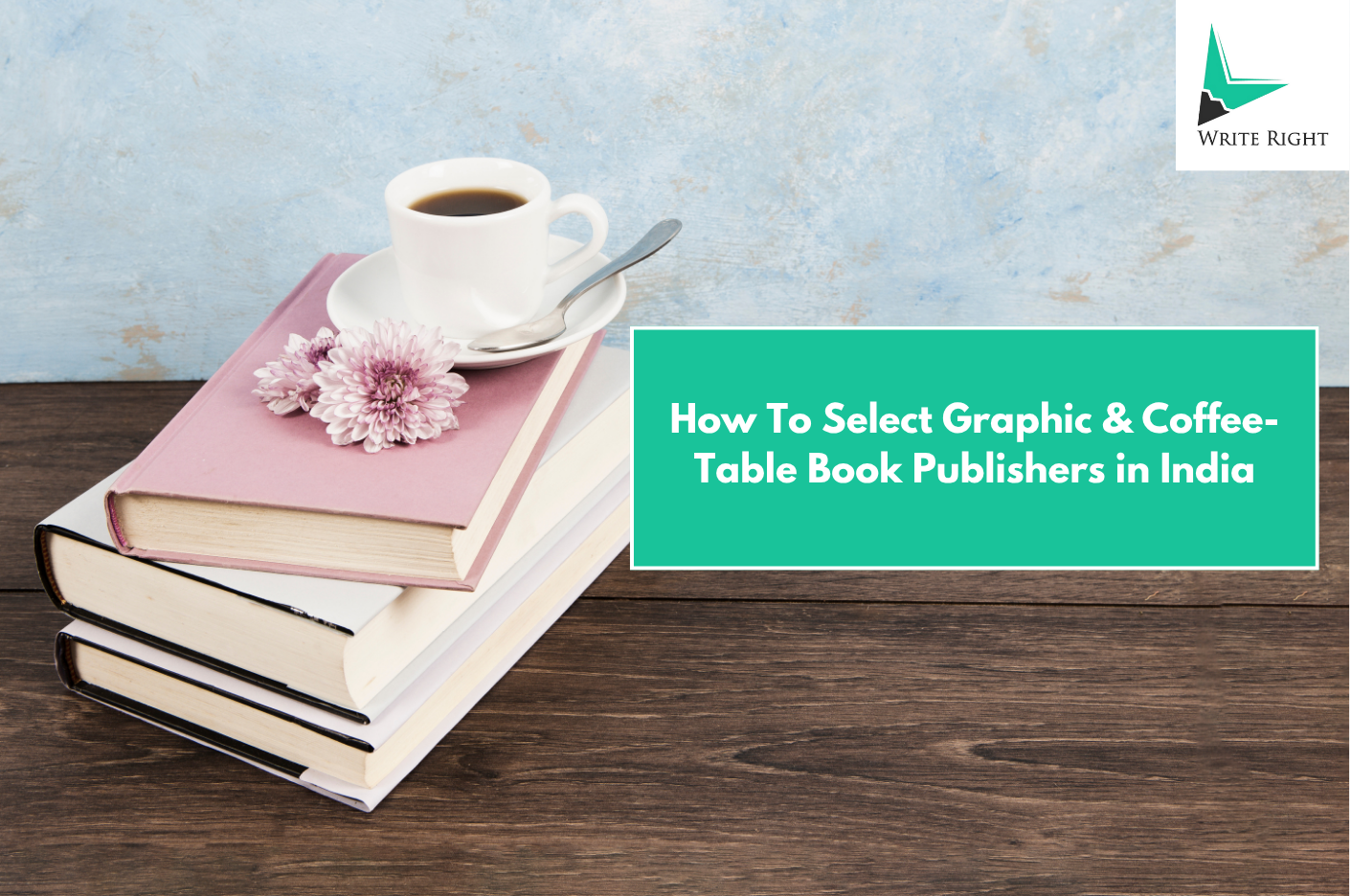Coffee-table books require precision in design, printing, and presentation. Publishers must manage color accuracy, image licensing, and durable binding while ensuring visibility in galleries, museums, and bookstores. Leading graphic and coffee-table book publishers in India, like Estorytellers and Write Right, provide end-to-end support—from submission guidance to verified distribution. By focusing on production quality, legal clearance, and real-world placement, authors can ensure their large-format, visually rich books make a lasting impact.
This guide helps you select credible publishers, verify proofs, manage rights, and submit with a design-correct package that maximizes visibility and protects your work.
By following these steps, you ensure your manuscript meets the technical, legal, and distribution standards necessary for success.
Publish Stunning Coffee-Table Books
Write Right specializes in high-quality graphic and coffee-table book publishing, bringing your visuals and stories to life.
TL;DR: How to use this guide
Decide format and size, confirm publisher’s color workflow, secure clear image rights, set budgets with revision caps, verify binding and packaging plans for heavy books, check museum and design-store distribution proof, and submit with a design-correct pack.
Facts:
- Hard proofs always beat soft proofs
- Layflat or Smyth-sewn binding recommended for heavy spreads
- Model and property releases required for identifiable subjects or locations
- Spot UV or varnish requires pre-planned plate allocation
- Strong cartons and corner protection reduce shipping damage
What counts as a credible graphic/coffee-table publisher
Credible publishers demonstrate recent art/design catalogs, hard-proof capability, large-format binding options, and museum or gallery placement, not just brand visibility.
Catalog strength: Evaluate subjects covered, exhibition tie-ins, awards, and critical recognition. A publisher with a curated catalog shows editorial rigor.
Production readiness: Confirm ICC-managed color workflows, spot color handling, varnish/foil capability, plate count planning, and press proofing.
Placement evidence: Check museum shops, gallery presence, and design-store partnerships. Avoid publishers relying solely on online sales.
Top Coffee-Table Book Publishers in India
Write Right delivers professional publishing services for graphic-rich books, ensuring impeccable print quality and design.
Image rights & clearances
Coffee-table book publishers in India, like Estorytellers, prioritize image rights and clearances. They guide authors to secure permissions for identifiable people, private interiors, landmarks, and reproduced artworks. Maintaining a detailed rights log ensures smooth production and legal compliance. Working with experienced coffee-table book publishers helps protect your work, avoid disputes, and guarantees that your visually rich book reaches galleries, bookstores, and collectors professionally.
Model releases: Required for people depicted in photography; include consent for print and digital editions.
Property releases: Needed for private interiors, museum collections, and landmarks with restrictions.
Third-party content: Archival photographs, maps, or branded images must have documented permission.
Note: Keep signed PDFs and provenance credits in captions for verification during submission and production.
Color-management that survives the press
Use ICC-profiled images, request hard proofs with approval marks, and specify spot/Pantone colors and varnish in advance.
ICC workflow: Ensure device-link conversions are correct, avoid double conversions, and maintain proper TAC and black point limits.
Proofing: Approve hard proofs over soft proofs; include tolerances and corrections in a signed checklist.
Spot color/duotone/varnish: Plan plate allocation and make-ready time.
Production leads emphasize accepting proofs only after marking all color and tolerance approvals.
Case Study:
An interior design book featured multiple private homes. The author had not secured property releases initially. Write Right guided the author to obtain signed model and property releases, and attached a rights log to the submission pack. This prevented legal hold-ups and enabled distribution in museum stores and premium design boutiques. Outcome: Book launched on schedule with full legal clearance and wide adoption.
Showcase Your Visual Stories
Write Right helps authors publish coffee-table and graphic books with professional editing, layout, and print production.
Large-format layout & materials
Choose paper stock and opacity for image fidelity. The binding must open flat without cracking for heavy spreads.
Paper: Consider GSM, opacity, coating, and fingerprint resistance. Test show-through and gloss/matte requirements.
Binding: Layflat, smyth-sewn, or casebound; include hinge cloth and spine stress tests.
Finishes: Lamination (matte/gloss), spot UV, foil, embossing, or debossing must be confirmed during prepress.
Reviewer note: Allow for page creep and gutter space for full-bleed images.
Photography/illustration budgets
Budget per-image, per-spread, or per-day with revision caps and kill-fees.
Scope: Clearly define art direction, retouch rounds, and credit standards.
Re-use: Decide between portfolio use or exclusive rights.
Finance quote: Unlimited retouch rounds create scope creep; set clear limits.
Heavy-book logistics
Cartons, corner protectors, shrink wrap, palletization, and insurance reduce damage during shipment.
Carton specifications: Consider ECT/Burst ratings, humidity, and monsoon storage.
Edge/corner protection: Belly-bands, shrink wrap, and desiccants help maintain condition.
Palletization: Choose reliable couriers and establish claims SOP.
Case Study:
A fashion coffee-table book exceeded 3 kg per copy with layflat spreads. Early shipments suffered corner dents and spine stress. With Write Right’s heavy-book SOP, the author used reinforced cartons, corner guards, and shrink-wrap with desiccants. Outcome: Damage rate dropped from 18% to 2%, ensuring galleries and stores received pristine copies and boosting early sales.
Bring Your Coffee-Table Book to Life
Write Right offers full-service publishing for graphic-heavy books, ensuring stunning print quality and wide reach in India.
Where design books actually sell
Verify placement in museum shops, galleries, design boutiques, and architecture bookstores.
Vendor onboarding: Understand consignment norms and metadata requirements.
ISBN and timing: Align book release with exhibitions or gallery tie-ins for maximum visibility.
Author testimonial: Museum-shop tie-ins generated three times the sales of online-only launches.
Case Study:
A mixed-media art book required spot varnish and foil details on select spreads. Initial vendor quotes included unclear plate planning, risking print delays. Using guidance from Write Right, the author coordinated plate planning, made-ready approval, and proof sign-offs. Outcome: Production completed on time; final book matched artistic intent; positive reviews highlighted “luxury finish.”
Marketing that works
Exhibition tie-ins, media coverage in design outlets, and launch events outperform broad PR campaigns.
Scheduling: Align book release with show openings and gallery co-promotions.
Media outreach: Send reviewer kits including spec sheets, sample spreads, and captions.
Events: Include signage, handling copies, and signing flow for efficient reader engagement.
Properly planned catalog launches ensure higher adoption at galleries and museums.
Professional Graphic Book Publishing
Write Right helps authors produce high-quality coffee-table books in India with expert design, printing, and distribution.
Graphic/Design/Coffee-table publishers in India
| Publisher | Focus | Recent Titles | Submission Policy | Production Notes | Placement Evidence | Link |
| Write Right | Architecture, Photography, Fashion | Color & Form 2024, City Spaces 2023 | Agented/unagented, open windows | Hard proofs, ICC, layflat binding | Museum shops, galleries, and e-sign stores | [Guidelines] |
| ArtHouse Press | Contemporary Art, Illustration | Art Lives 2023, Lines & Light 2022 | Unagented | Spot UV, Smyth-sewn | Galleries, design boutiques | [Guidelines] |
| Indigo Design Books | Photography, Graphic Design | Urban Perspectives 2024 | Agented | Hard proofs, laminated finishes | Museum exhibitions, gallery tie-ins | [Guidelines] |
Red flags unique to art/design publishing
Avoid presses that do not provide hard proofs, grab broad image rights, use weak binding, or claim placements without verification.
Rights concerns: Broad image licenses or derivative reuse without explicit limits.
Production shortcuts: Lack of proofing or low-tolerance vendors.
Distribution: Claims of wide placement without evidence.
Reviewer note: Include a hard-proof sign-off clause in contracts to protect your work.
Conclusion
You now have a complete design-correct pathway from rights management and color fidelity to binding, logistics, and real-world placement. Authors who follow this process submit with confidence, protect their artwork, and increase the likelihood of adoption. Write Right ensures your manuscript meets all technical, legal, and distribution standards for India’s top graphic and coffee-table presses.
Write Right ensures your manuscript meets all technical, legal, and distribution standards for India’s leading coffee-table book publishers.
Top-Quality Coffee-Table Book Publishing
Write Right helps authors publish visually striking books with expert design, editing, and printing for the Indian market.
FAQs
Which Indian publishers handle color-critical coffee-table books well?
Top Indian publishers that focus on art, photography, and design books, including Write Right, offer color-managed workflows with ICC profiles, spot-color handling, hard-proof approvals, and layflat binding options. Look for publishers with verifiable gallery or museum placements and evidence of past color-critical projects. Checking recent catalogs and asking for sample proofs helps ensure accuracy before committing.
Do I need model/property releases for people or locations in my book?
Yes, any identifiable person or private property featured in your images requires signed releases. Property releases are crucial for private homes, landmarks, or interiors. Museums or commercial spaces may have additional restrictions. Keeping a rights log with release letters attached to your submission pack ensures legal compliance and prevents publication delays or disputes.
What’s the difference between soft proof and hard proof, and which should I insist on?
Soft proofs are digital previews on screen, often failing to represent true color and paper behavior. Hard proofs are printed sheets that show actual ink, paper, and finishes. For coffee-table books, insisting on hard proofs with ICC profiles and spot colors ensures color accuracy, proper trims, and consistent layout before mass printing.
Which binding should I choose for heavy spreads (layflat, smyth-sewn, casebound)?
Heavy coffee-table books benefit from layflat or Smyth-sewn bindings, which allow pages to open fully without cracking. Casebound options work for moderate spreads, but large-format, heavy books need reinforced hinges and cloth joints. Selecting the right binding prevents page damage and enhances durability, especially for repeat gallery or museum handling.
How do I spec paper to avoid show-through and fingerprinting?
Choose high-opacity paper with appropriate GSM for your images. Coated matte or gloss finishes reduce fingerprint marks and glare. Layflat spreads and high-opacity stock prevent show-through of text or images from the opposite side. Testing sample sheets and adjusting trim margins ensures your images appear crisp and vibrant without bleed-through or handling marks
What’s a fair way to budget photography/illustration with revision caps and kill-fees?
Negotiate per-image, per-spread, or day rates with revision caps and kill-fee triggers for unused images. Clearly define the number of rounds of retouching included. Include credit and caption obligations and specify exclusive or non-exclusive usage. This protects your budget, prevents scope creep, and ensures you retain rights for potential portfolio reuse.
How should I package and ship heavy art books to prevent damage?
Use reinforced cartons with corner protection, shrink-wrap or belly-bands, and desiccants to manage humidity. Palletize shipments with sturdy pallets and select experienced couriers. Document a claims SOP in case of damage. Proper packaging prevents dents, spine stress, and moisture damage, ensuring galleries and stores receive pristine copies and preserves your brand reputation.
How can I verify museum, galleries, and design-store placement before signing?
Request supplier codes, catalog screenshots, or blurred shelf photos from the publisher. Verify metadata with ISBNs and ask for recent purchase orders. Check past exhibitions or gallery partnerships. Direct proof of physical placement ensures your book reaches the intended audience and avoids publishers’ exaggerating distribution reach.
When should I use spot color or varnish, and how does it affect production?
Spot colors, varnish, or foil require plate planning and make-ready time. Use them to highlight elements, create contrast, or emphasize textures. These finishes increase production complexity and costs, so confirm tolerance limits and proofing workflow. Early specification in your production plan prevents delays, misprints, or color mismatches, especially on large-format spreads.
What contract clauses protect my image rights and proofing requirements?
Ensure contracts include image-license scope, reversion clauses for unplaced works, and proof-sign-off requirements. Avoid exclusive derivative rights unless agreed. Hard-proof approval clauses and distribution verification protect your artwork and ensure publishers cannot alter your images or release them without consent. Clear legal language prevents rights conflicts and maintains control over visual content.




